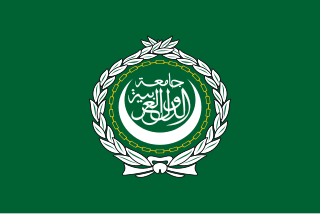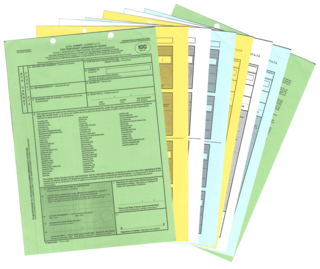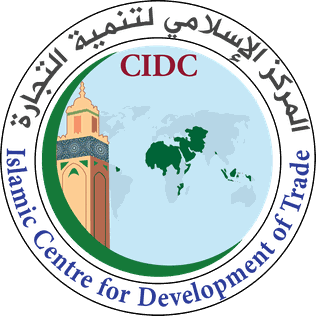
The Organisation of Islamic Cooperation, formerly the Organisation of the Islamic Conference, is an intergovernmental organization founded in 1969. It consists of 57 member states, 48 of which are Muslim-majority. The organisation claims to be "the collective voice of the Muslim world" and works to "safeguard and protect the interests of the Muslim world in the spirit of promoting international peace and harmony".

The Arab League, formally the League of Arab States, is a regional organization in the Arab world. The Arab League was formed in Cairo on 22 March 1945, initially with seven members: Egypt, Iraq, Transjordan, Lebanon, Saudi Arabia, Syria, and North Yemen. Currently, the League has 22 members.

The International Chamber of Commerce is the largest, most representative business organization in the world. ICC represents over 45 million businesses in over 170 countries who have interests spanning every sector of private enterprise.

A chamber of commerce, or board of trade, is a form of business network. For example, a local organization of businesses whose goal is to further the interests of businesses. Business owners in towns and cities form these local societies to advocate on behalf of the business community. Local businesses are members, and they elect a board of directors or executive council to set policy for the chamber. The board or council then hires a president, CEO, or executive director, plus staffing appropriate to size, to run the organization.

The South Asian Association for Regional Cooperation (SAARC) is the regional intergovernmental organization and geopolitical union of states in South Asia. Its member states are Afghanistan, Bangladesh, Bhutan, India, Maldives, Nepal, Pakistan, and Sri Lanka. SAARC comprises 3% of the world's land area, 21% of the world's population and 5.21% of the global economy, as of 2021.

The Economic Cooperation Organization or ECO is a Eurasian political and economic intergovernmental organization that was founded in 1985 in Tehran by the leaders of Iran, Pakistan, and Turkey. It provides a platform to discuss ways to improve development and promote trade and investment opportunities. The ECO is an ad hoc organisation under the United Nations Charter. The objective is to establish a single market for goods and services, much like the European Union. After the dissolution of the Soviet Union, the ECO expanded to include Afghanistan, Azerbaijan, Kazakhstan, Kyrgyzstan, Tajikistan, Turkmenistan, and Uzbekistan in 1992.

The Australian Chamber of Commerce and Industry (ACCI) is Australia's largestbusiness association, comprising state and territory chambers of commerce and national industry associations. ACCI represents Australian businesses of all shapes and sizes, across all sectors of the economy, and from every corner of the country.
The Tanzania Chamber (TCCIA) is a Tanzanian government institution with a mandate to promote industry and business, and to facilitate an interface between the private sector and public sector in the country. TCCIA was founded in 1988 and its head offices are in Dar es Salaam. It has played in important role in the privatization and liberalization of Tanzania's economy.

The ATA Carnet, often referred to as the "Passport for goods", is an international customs document that permits the tax-free and duty-free temporary export and import of nonperishable goods for up to one year. It consists of unified customs declaration forms which are prepared ready to use at every border crossing point. It is a globally accepted guarantee for customs duties and taxes which can replace the security deposit required by each customs authority. It can be used in multiple countries in multiple trips up to its one-year validity. The acronym ATA is a combination of French and English terms "Admission Temporaire/Temporary Admission". The ATA carnet is now the document most widely used by the business community for international operations involving temporary admission of goods.

Federation of Bangladesh Chambers of Commerce and Industries is the apex trade organization of Bangladesh playing consultative and advisory role in safeguarding the interests of the private sector in the country.

Pakistan–Turkey relations are the bilateral relations between Pakistan and Turkey. Pakistan has an embassy in Ankara, a Consulate-General in Istanbul and an honorary consulate in İzmir whereas, Turkey has an embassy in Islamabad, a Consulate-General in Karachi and Lahore and honorary consulates in Peshawar, Sialkot and Faisalabad. As of 2016, in a joint communique, Pakistan and Turkey plan to strengthen their close ties into a strategic partnership.

Since its inception in 1950, Federation of Pakistan Chambers of Commerce & Industry (FPCCI) has advocated and voiced the collective opinion, concern and aspiration of the private sector and offered helpful advice and solid assistance to the Government in its efforts to promote exports, encourage foreign investment and stimulate economic activity in Pakistan.
The Karachi Chamber of Commerce and Industry (KCCI) is the Chamber of Commerce for Karachi, Pakistan.

The Asian Parliamentary Assembly (APA) aims to promote peace in general, and in the Asian region in particular. It was established as the Association of Asian Parliaments for Peace (AAPP) in September 1999 by Sheikh Hasina, acquiring its current name in 2006 during the Seventh Session of the AAPP. The APA consisted, as of 2007, of 41 Member Parliaments and 17 observers. Each Member Parliament has a specific number of seats in the Assembly based on the size of their population. The number of total seats, and therefore, number of votes, is currently 206. Members of Assembly must be elected by members of the Member Parliaments. The APA Charter and Tehran Declaration lay out a framework of cooperation among Asian countries, and point out to a vision; that is Asian Integration.

Pakistan–Somalia relations are the bilateral relations between Pakistan and Somalia. Both Organisation of Islamic Cooperation members, the two countries have historically maintained strong relations. Somalia also has an embassy in Islamabad.
SAARC Chamber of Commerce and Industry, recognized as a regional apex trade body by South Asian Association for Regional Cooperation is a constellation of the eight national Federation Chambers of Commerce and Industry of the member states of SAARC. The rationale behind the creation of SAARC Chamber of Commerce and Industry of the SAARC countries was to promote trade and industry in the region and to develop and achieve common objectives in the areas of trade and industry, moreover, the SAARC Chamber of Commerce and Industry is also accepted as the voice of the private sector across the region.

Islamic Centre for Development of Trade is an intergovernmental organization and one of the seven subsidiary organs of the Organisation of Islamic Cooperation entrusted with the promotion of trade, economic development and commercial cooperation in public and private sectors across the 57 member states.
The Islamic Chamber of Commerce, Industry and Agriculture (ICCIA) is an affiliate of the Organization of Islamic Cooperation (OIC) and represents the private sector of 57 member countries. It is headquartered in Karachi, Pakistan. ICCIA was founded in 1978 and its key objective is to promote the role of the private sector in economic activity.

The Digital Cooperation Organization (DCO) is a global multilateral body launched in November 2020. It aims at enabling digital prosperity for all by accelerating the sustainable and inclusive growth of the digital economy and facilitating cooperation in response to the dynamic challenges of the digital era. Created to address the diverse aspects of the digital landscape, the DCO seeks to encourage cooperation among Member States in areas including digital innovation and digital governance. As of January 2024, Member States include Bahrain, Bangladesh, Cyprus, Djibouti, The Gambia, Ghana, Greece, Jordan, Kuwait, Morocco, Nigeria, Oman, Pakistan, Qatar, Rwanda and Saudi Arabia.














